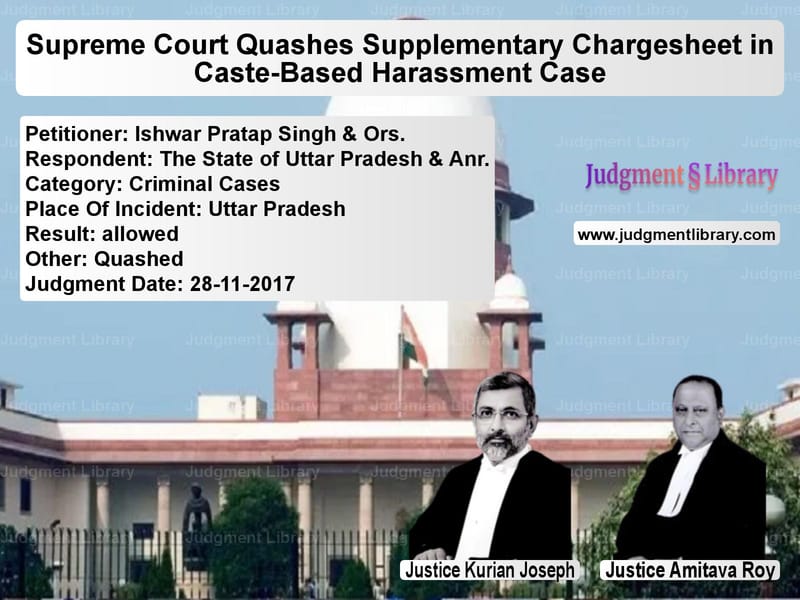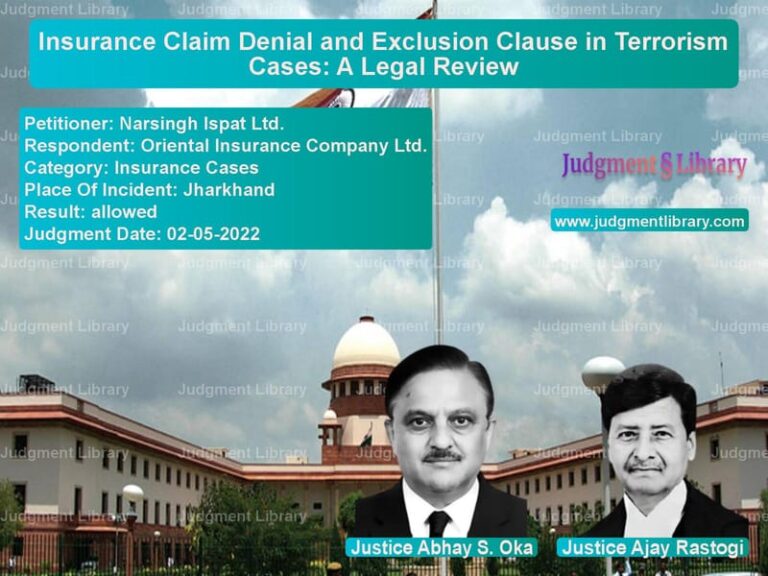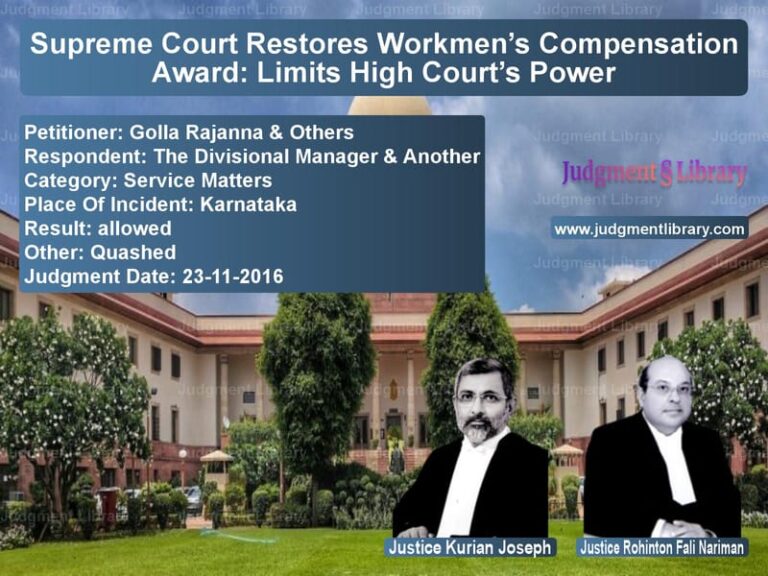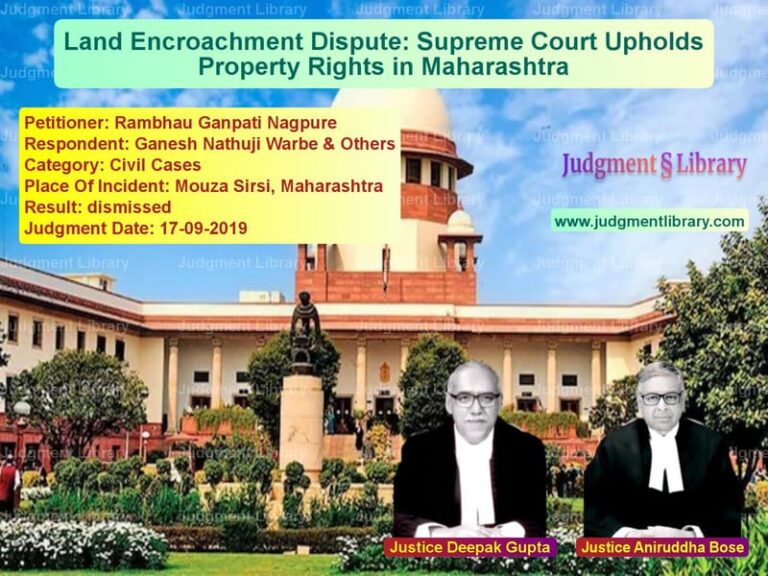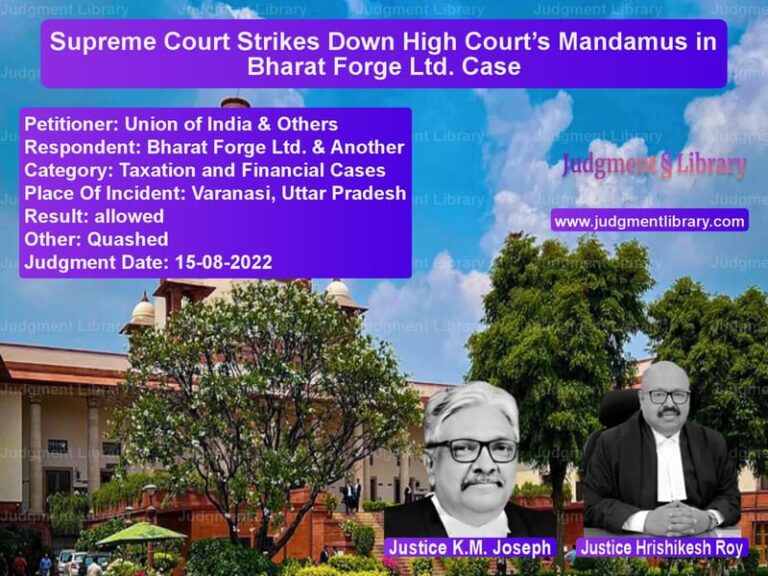Supreme Court Quashes Supplementary Chargesheet in Caste-Based Harassment Case
The Supreme Court of India recently ruled on the case of Ishwar Pratap Singh & Ors. vs. The State of Uttar Pradesh & Anr., which involved an appeal against the High Court’s decision to dismiss a petition under Section 482 of the Criminal Procedure Code (CrPC). The petitioners challenged the addition of Section 3(1)(x) of the SC/ST (Prevention of Atrocities) Act in a case that originally only involved charges under Sections 323, 504, and 506 of the Indian Penal Code (IPC). This ruling addressed concerns regarding the scope of external agency intervention in criminal investigations, particularly the role of the National Commission for Scheduled Castes in influencing criminal proceedings.
Background of the Case
The incident in question occurred on July 25, 2004, when the complainant, Ram Bahadur, lodged an NCR (Non-Cognizable Report) at the Motiganj Police Station, District Gonda, Uttar Pradesh. In his complaint, Ram Bahadur alleged that he was assaulted and threatened by the appellants, who were accused of using derogatory language and threatening to kill him. Initially, the charges in the NCR were filed under Sections 323 (voluntarily causing hurt), 504 (intentional insult), and 506 (criminal intimidation) of the IPC.
However, over two years later, the National Commission for Scheduled Castes intervened and directed the inclusion of Section 3(1)(x) of the SC/ST Act, which deals with intentional insults or threats to members of Scheduled Castes in public. The police, following the Commission’s directive, filed a supplementary chargesheet under this new provision, adding the charge of caste-based harassment against the appellants. The appellants challenged the addition of the SC/ST Act charges, claiming that the inclusion of Section 3(1)(x) was done arbitrarily and without proper grounds.
Arguments of the Petitioners (Ishwar Pratap Singh & Ors.)
- The petitioners argued that the addition of Section 3(1)(x) of the SC/ST Act was arbitrary and that no case had been made out for invoking the provision.
- They contended that the original FIR did not include any mention of caste-based insults or harassment, and the charges under the SC/ST Act were added retrospectively without proper investigation or justification.
- The petitioners also argued that the High Court erred in dismissing their petition under Section 482 CrPC, which allowed them to seek the quashing of the supplementary chargesheet.
Arguments of the Respondent (The State of Uttar Pradesh)
- The respondents, representing the State of Uttar Pradesh, argued that the direction to add Section 3(1)(x) was made following a formal inquiry conducted by the National Commission for Scheduled Castes.
- The respondents claimed that the police had complied with the Commission’s directive and that the charges under the SC/ST Act were appropriate given the allegations of caste-based harassment.
- The respondents further asserted that the inclusion of Section 3(1)(x) was consistent with the aim of protecting the rights of Scheduled Castes and preventing caste-based atrocities.
Supreme Court’s Observations and Judgment
The Supreme Court carefully examined the case, focusing on the role of the National Commission for Scheduled Castes in influencing criminal investigations. The Court made several key observations:
1. No External Agency Can Dictate the Course of Investigation
The Court reaffirmed the well-established principle that no external agency can dictate the course of a police investigation. The Court observed:
“The investigation of a case is within the exclusive domain of the police, and no external agency can direct or dictate the course of that investigation. While the National Commission for Scheduled Castes can raise concerns and point out lapses in investigations, it cannot compel the police to add charges without a proper basis.”
2. Role of the National Commission for Scheduled Castes
The Court clarified the role of the Commission, noting that its duty is to address grievances related to caste-based atrocities and discrimination, not to supervise investigations. The Court stated:
“The Commission’s role is to investigate complaints and make recommendations, but it does not have the power to dictate the nature of criminal charges or force the inclusion of additional charges unless the facts of the case warrant such a move.”
3. Legal Oversight of Police Investigations
While the Court emphasized the police’s authority to investigate, it also recognized that in exceptional cases, superior courts may intervene. The Court noted:
“Superior courts can intervene in exceptional cases to ensure that investigations are carried out fairly and in accordance with the law. However, such intervention should be limited to ensuring justice, not supervising routine investigative processes.”
4. No Grounds for Quashing the Chargesheet
The Court found that the inclusion of Section 3(1)(x) in this case was not justified, as there was no evidence to support the claim of caste-based harassment. The Court ruled:
“The ingredients of Section 3(1)(x) of the SC/ST Act were not met in this case. There was no allegation of caste-based harassment in the original FIR, and the supplementary chargesheet was filed without a valid basis.”
5. Inherent Powers Under Section 482 CrPC
The Court reiterated that the High Court had the authority to quash a chargesheet under Section 482 CrPC to prevent the abuse of legal process. The Court ruled:
“The High Court should have exercised its inherent powers under Section 482 CrPC to quash the chargesheet insofar as it related to Section 3(1)(x) of the SC/ST Act. There was no material to support the addition of this charge, and its inclusion amounted to an abuse of process.”
Final Judgment
The Supreme Court allowed the appeal and quashed the supplementary chargesheet filed under the directions of the National Commission for Scheduled Castes. The Court held:
- The charge under Section 3(1)(x) of the SC/ST Act was unjustified and lacked supporting evidence.
- The High Court should have intervened under Section 482 CrPC to prevent the abuse of legal process.
- The Court’s decision does not prevent the police from continuing their investigation or adding charges based on new evidence, but the specific charges under the SC/ST Act were quashed.
Conclusion
The Supreme Court’s ruling highlights the importance of ensuring that criminal investigations are conducted in accordance with the law and without external interference. While the National Commission for Scheduled Castes plays an important role in safeguarding the rights of Scheduled Castes, its recommendations must be backed by adequate evidence and legal grounds. The judgment reinforces the principle that legal processes should not be misused to add charges that are not substantiated by the facts of the case.
Don’t miss out on the full details! Download the complete judgment in PDF format below and gain valuable insights instantly!
Download Judgment: Ishwar Pratap Singh vs The State of Uttar P Supreme Court of India Judgment Dated 28-11-2017.pdf
Direct Downlaod Judgment: Direct downlaod this Judgment
See all petitions in SC/ST Act Case
See all petitions in Criminal Defamation
See all petitions in Bail and Anticipatory Bail
See all petitions in Judgment by Kurian Joseph
See all petitions in Judgment by Amitava Roy
See all petitions in allowed
See all petitions in Quashed
See all petitions in supreme court of India judgments November 2017
See all petitions in 2017 judgments
See all posts in Criminal Cases Category
See all allowed petitions in Criminal Cases Category
See all Dismissed petitions in Criminal Cases Category
See all partially allowed petitions in Criminal Cases Category

